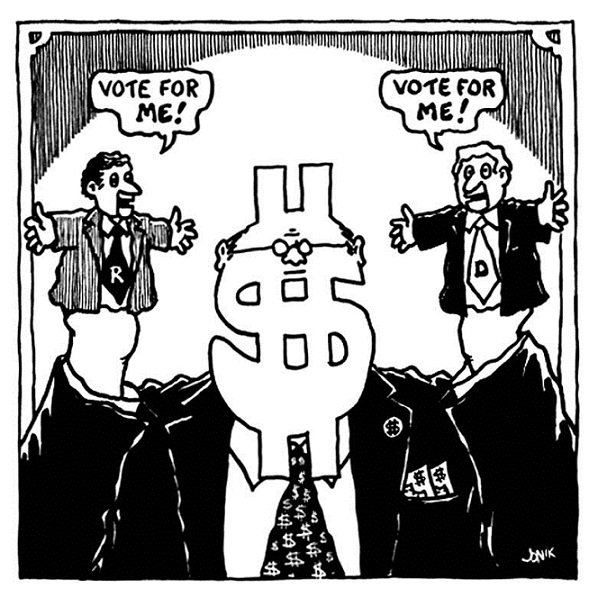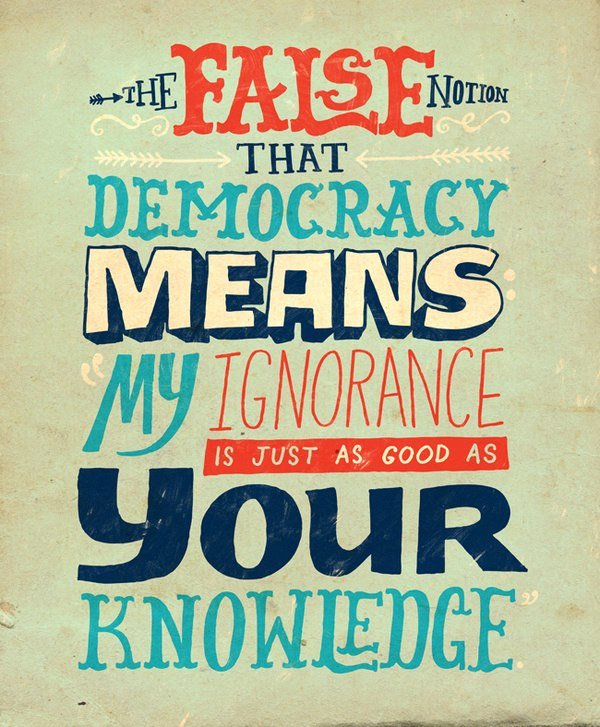The following post is related to Social Futurism (SF) and the Zero State (ZS), but only reflects the views of the author (Ámon Ásentír, AKA Dr. M. Amon Twyman). Within the SF/ZS sphere of influence, the basic logic is that anyone can say or do anything they want as long as they are acting in accord with the Principles of Social Futurism.
ON DEMOCRACY: Value and Limits
What is Democracy?
Everybody thinks they know what Democracy is. Most of them are wrong. “Democracy” is not actually any single form of governance, but is instead a word covering a wide range of approaches to governance. Its two broadest common categorizations are “Direct Democracy” and “Representative Democracy”. The former would have been recognizable to the ancient Greeks, and involves small (i.e. up to town-sized) groups of people personally voting on issues relating to their own governance. The latter is the system we know as “Democracy” in the modern West, in which a handful of professional politicians (mostly from privileged backgrounds) pretend to make decisions on behalf of the populace, while actually serving Oligarchs, Plutocrats, and their own wallets. The term “Democracy” is frankly meaningless as a descriptor of any given system of governance, as evidenced by the fact that even the most Totalitarian 20th Century Communists (i.e. Marxist-Leninists, Stalinists, Maoists) made a point of calling their systems “Democratic”. In other words, the word “Democracy” in and of itself tells you little or nothing about how a specific “Democratic” system might actually work.

Must Democracy be Egalitarian? Is it even usually Egalitarian?
No, on both counts. But it is still important.
There is a common misconception (which is understandable given US propaganda over the last hundred years or so) that Democracy necessarily entails perfect Egalitarianism, with everyone having the vote and every vote having equal (high) value. Not only is that a fairly recent idea (women didn’t have the vote in the US until 1920, after all), but it also ignores the common abuses of Gerrymandering, Lobbying, the Electoral College, and indeed the general lack of need for politicians to pay more than lip service to listening to the electorate. In other words, Democracy does not in practice entail Egalitarianism, and it never has, although it does usually give the general citizenry a very important voice.

Who should be able to vote?
There have always been limits to suffrage. Sometimes that’s a very good thing.
Personally, by default I would advocate the broadest suffrage possible: i.e. give everyone the vote unless there is good reason to withhold it. I would also be inclined to take strong measures to make those votes count for more, but that’s another topic for another day. For now, the key issue is where to draw the line in identifying those who should not be allowed to vote.
If voting is to have any true value at all (i.e. other than as a sham designed to create an illusion of political engagement by the populace), then that value should be that it has some real effect on governmental decisions. As was commonly understood in the past, however, voters should have the capacity to make informed decisions about the issues at hand. We do not let children vote for the simple reason that they cannot possibly have a deep understanding of what they’d be voting for, and so we owe it to ourselves and our societies to think about who else might not be able to make informed, intelligent political decisions.
Now, of course we cannot count someone’s political views per se as a factor when deciding whether they can make intelligent or informed decisions. What we can and must do, however, is examine their capacity and willingness to actually refer to reality (which is to say, evidence), when coming to their views. People who are missing either the capacity or willingness to refer to actual evidence in making political decisions should be ineligible to vote. We already adopt this rule as a society when it comes to capacity, in that we don’t give the vote to children, animals, or the seriously cognitively challenged. For some reason, however, we seem to have decided that it’s OK to let people vote who simply refuse to use that capacity, repeatedly, deliberately, and systematically. In adopting this stance, we have all but invited certain “Bad Faith” political actors (such as Donald Trump and the current Russian administration) to take advantage of the wilful ignorance of partisan voters.

The Importance of Balance.
What are the parameters of Democracy, beyond suffrage? What should they be?
A Principled community must achieve a balance of core functions, with no single function asserting primacy over the others. The three core functions repeatedly converged upon by all human societies are (3) growers, producers & traders, (2) military & governance, and (1) priests, scribes, lawyers, educators, scientists and other intellectuals. More primitive societies are very “bottom heavy”, developing the higher functions as society as a whole develops.
There is invariably some kind of (4) “catch-all” function at the very bottom, such as the Shudra in India, slaves and auxiliary soldiers in ancient Rome, all the way to the mass consumers, zero-hour workers and child labourers of our modern society. It should be stressed that to Social Futurists, balance does not require strict caste systems or social immobility (as well it should not!), but just some kind of mechanism to ensure that imbalance between the functions will be rectified.
Any society in which one function has come to overwhelmingly dominate the others is sick, and will die if balance cannot be re-established. This is quite clear to all but the most brainwashed ideologues when you think about what such imbalance looks like:
Function 1 dominant:
Intellectuals of some sort exert control over all society. The most common historical form of this is probably Theocracy, although one might argue that Communist regimes with their Party ideologues commanding the military and strictly controlling the economy also fall into this category. Ancient Chinese Imperial Legalism is a good example of F1 dominance, with the “Mandarins” effectively running the Empire up until 1912.
Function 2 dominant:
When the military-governing class is dominant, we have the classic case of the Military Dictatorship or Junta and the Police State. This style of governing is familiar in the West as old-fashioned Monarchy, especially where the Monarch is not effectively limited by any Church or Parliament.
Function 3 dominant:
A society whose biggest decisions are all made by traders is idealized by many in our time (especially in the USA) as the “Free Market“; i.e. a way of doing things that leaves no room for explicit, intelligent governance or regulation. Putting the arguments of economic (i.e. Right) Libertarians aside, in this society there are no checks and balances which might otherwise control the most powerful traders, who then use their wealth to re-write society’s laws in their personal favour, giving rise to Oligarchy and/or Plutocracy.
Function 4 dominant:
This is a society in which pure Democracy reigns, at the complete expense of all specialised interests and institutions. Expertise (which, it must be admitted, is non-democratic in the sense that the general populace are not all experts in matters relevant to governance) is effectively excluded from all governance. This may sound satisfying to some, in a world which has over-favoured functions 2 & 3 for far too long, but if function 4 were allowed to truly dominate (rather than to simply play its proper role in a greater balance) then we would have Idiocracy.

CONCLUSION
Democracy has great value, but it also has limits.
There is no single system of governance universally understood to be “true” Democracy. Even the most Egalitarian advocates of Democracy must admit that some people are not well equipped to vote in an intelligent and informed manner. Ignoring that issue only endangers Democracy as a viable tool for the governance of modern societies, rather than strengthening it. Beyond questions of suffrage, we must also acknowledge that Democracy not also has great value in governance processes, but it also has serious limitations.
A purely Democratic society would be a disaster (primarily for its own people), and that is doubly true for a purely Democratic society which recognizes no limits on suffrage whatsoever. To understand that Democracy must be intelligently managed in order to have full value to society is not an attack on Democracy itself, but is a defence of it. If Democracy is abused and ill-supported for too long, it will cease to exist altogether in any meaningful sense.

Co-published on Amon's blog.
If you believe this post is spam or abuse, please report it to our DiscordYou got a 2.27% upvote from @buildawhale courtesy of @zero-state! #abuse channel.
If you want to support our Curation Digest or our Spam & Abuse prevention efforts, please vote @themarkymark as witness.
Congratulations @zero-state! You received a personal award!
Click here to view your Board of Honor
Do not miss the last post from @steemitboard:
Congratulations @zero-state! You received a personal award!
You can view your badges on your Steem Board and compare to others on the Steem Ranking
Vote for @Steemitboard as a witness to get one more award and increased upvotes!
Congratulations @zero-state! You have completed the following achievement on the Hive blockchain and have been rewarded with new badge(s):
Your next target is to reach 50 replies.
You can view your badges on your board and compare yourself to others in the Ranking
If you no longer want to receive notifications, reply to this comment with the word
STOPSupport the HiveBuzz project. Vote for our proposal!